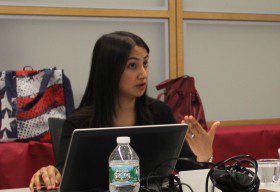
“It may seem chaotic, and quite frankly it is”, said Tara Béteille describing the complicated power play between teachers and politicians in India.
By Ghazal Gulati and Divya Sooryakumar, International Education Policy Ed. M Candidates, Harvard Graduate School of Education
Tara Béteille of the World Bank joined the South Asia Institute on Thursday, October 30th to discuss teacher accountability in India at an Education Seminar titled ‘Powerplay: Teacher Transfers in India.’ She dove head first into the complex dynamics underlying the nexus between government school teachers and politicians. The seminar was chaired by Akshay Mangla, Assistant Professor, Harvard Business School.
Despite admirably high enrollment rates, the quality of education in India is dismally low, Dr. Béteille explained. One of the factors impacting learning levels is high teacher absenteeism and low accountability in the public school system. Interestingly, teacher accountability is being compromised by an interdependent relationship between the teachers and the politicians.
Through her research, Dr. Béteille has uncovered the murky world of politically motivated teacher transfers in three states: Rajasathan, Karnataka, and Madhya Pradesh. The alliance between politicians and government school teachers has been under-wraps for many years due to the intricate legal ramifications of their relationship. Further, limited awareness and research on the topic, has allowed this illicit relationship to flourish.
Owing to their high social status in local communities, teachers are used for unofficial and illegal election campaigning by the politicians. On the other hand, teachers need political approval to be transferred to desirable schools and locations.
However, politicians and their intermediaries often exploit teachers to their advantage. Through her research, Dr. Béteille found that over 70% of teachers across the three states felt they needed to pay a bribe or have a connection to secure a suitable transfer. Using this upper hand, the politicians also have the ability to “discipline” teachers by transferring them to remote under-resourced school districts, in rural areas.
It is a complicated relationship with several individuals benefitting from this system. Between the government officials and the teachers are political middlemen who thrive on informational asymmetries. These middlemen promise teachers desirable transfers in exchange for a small payment.
Béteille described Karnataka as a place where functioning non-corrupt teacher transfer systems are in place, yet teachers continue to use middlemen for transfers simply due to a lack of awareness. While the situation seems bleak, Ms. Béteille did point out that states like Karnataka and Tamil Nadu are using technology to create transparency in the system, which would help establish accountability.
The audience asked several pertinent questions about the prevalence of powerplays in other sectors, the role of the central government, and parallels in other developing countries. The discussion ended with Dr. Béteille expressing an urgency for a fundamental shift in the perception of teacher transfers from all stakeholders involved.
